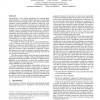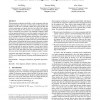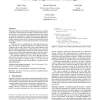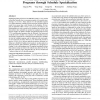154
click to vote
PLDI
2012
ACM
13 years 4 months ago
2012
ACM
Linearizability is a key design methodology for reasoning about tations of concurrent abstract data types in both shared memory and message passing systems. It provides the illusi...
118
click to vote
PLDI
2012
ACM
13 years 4 months ago
2012
ACM
JavaScript performance is often bound by its dynamically typed nature. Compilers do not have access to static type information, making generation of efficient, type-specialized m...
113
click to vote
PLDI
2012
ACM
13 years 4 months ago
2012
ACM
To report a compiler bug, one must often find a small test case that triggers the bug. The existing approach to automated test-case reduction, delta debugging, works by removing ...
PLDI
2012
ACM
13 years 4 months ago
2012
ACM
When program verification tools fail to verify a program, either the program is buggy or the report is a false alarm. In this situation, the burden is on the user to manually cla...
106
click to vote
PLDI
2012
ACM
13 years 4 months ago
2012
ACM
In this article we present a general method for achieving global static analyzers that are precise, sound, yet also scalable. Our method generalizes the sparse analysis techniques...
PLDI
2012
ACM
13 years 4 months ago
2012
ACM
This paper addresses the problem of reducing unnecessary conflicts in optimistic synchronization. Optimistic synchronization must ensure that any two concurrently executing trans...
169
click to vote
PLDI
2012
ACM
13 years 4 months ago
2012
ACM
Concurrent, object-oriented programs often use thread-safe library classes. Existing techniques for testing a thread-safe class either rely on tests using the class, on formal spe...
120
click to vote
PLDI
2012
ACM
13 years 4 months ago
2012
ACM
Parallel programs are known to be difficult to analyze. A key reason is that they typically have an enormous number of execution interleavings, or schedules. Static analysis over...
143
click to vote
PLDI
2012
ACM
13 years 4 months ago
2012
ACM
Research scientists and medical professionals use imaging technology, such as computed tomography (CT) and magnetic resonance imaging (MRI) to measure a wide variety of biological...
128
click to vote
PLDI
2012
ACM
13 years 4 months ago
2012
ACM
Modern architectures implement relaxed memory models which may reorder memory operations or execute them non-atomically. Special instructions called memory fences are provided, al...




